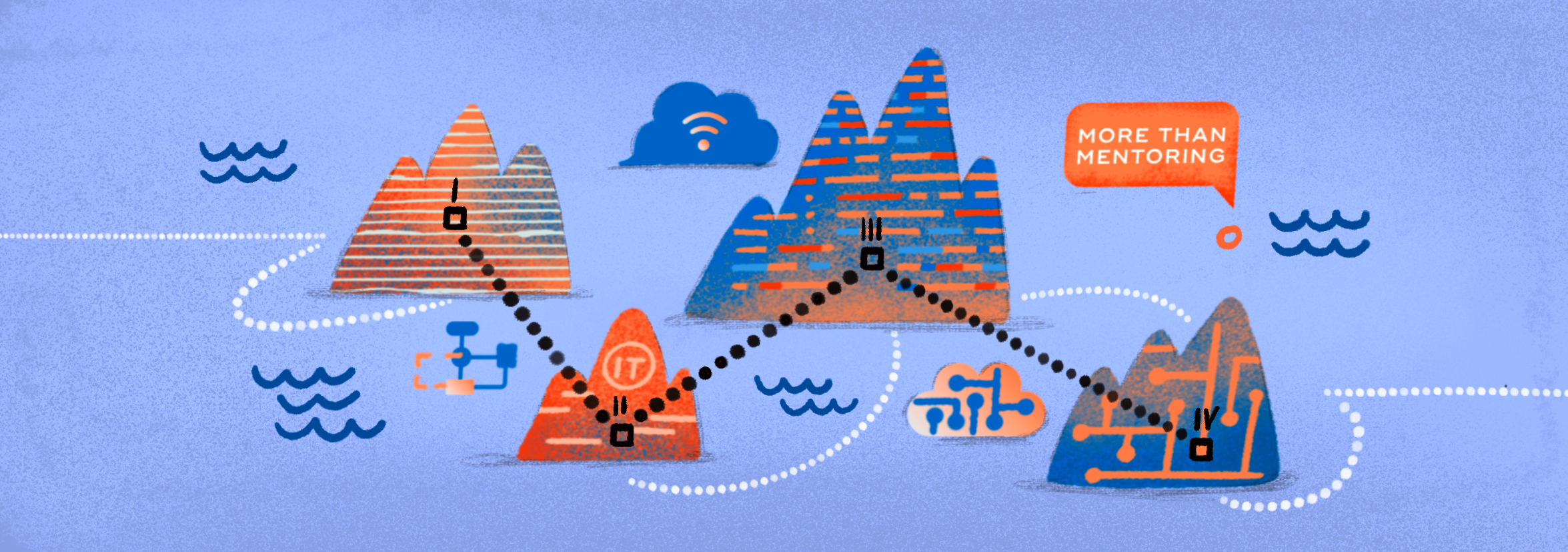The Four Most Important Fields of IT Mentoring

As an ever-growing industry, getting into IT can feel a bit like dipping your toe into a vast and almost endless ocean. That being said, working with a mentor who has a good grounding of the important fields in IT can really help you get a grip on things.
Of course, while every mentor has their own style and approach, most will ultimately cover the same basic IT mentoring fields. Not only do these fields give a good general grounding in IT and the IT industry, but they can also help mentees to get a practical head start.
So let’s take a closer look at four of the core IT mentoring fields and how a mentor could help build your understanding.
1. Troubleshooting
Perhaps the most important field in IT from a mentoring perspective, troubleshooting is a vital skill for anyone working in IT at just about every level. Whether you’re a software engineer or a one-man IT department, sooner or later, you’re going to be asked to help put out fires and that’s why it’s vital that you understand the troubleshooting process.
Naturally there’s the technical side to troubleshooting (after all, the answer isn’t always “just turn it off and on again”), but there’s also an interpersonal side. Understanding that many of the people working with your system might not know much about IT themselves means being able to communicate with a layman.
In fact, there’s an entire side to IT that’s just communication. You’ll need to know which questions to ask, how to phrase them, and how to talk with the rest of your team. Furthermore, you’ll need to be able to communicate vital information back to those without IT expertise. That information could be anything from how to get the printer working to crucially important cyber-security procedures.
When all’s said and done, any career in IT requires the ability to diagnose and solve technical problems. Being good at troubleshooting always pays off.
2. Development
From the general to the niche, development might not be a field that comes up for every IT professional, but for those who specialise in it, it can be incredibly lucrative. In many respects, development, much like troubleshooting, is the place where the technical meets the pragmatic. Of course, the major difference is that instead of being face to face with the user, a developer has to predict what the user will do and how they will behave in advance.
To put it another way, a good developer understands IT but they also understand design. While a good mentor can’t teach the whole spectrum of design – as design is often highly specialised to the specific use case – they can cover the broad principles that govern good software and the practical methods for applying them in your work.
3. Networking
Networking is a crucial IT mentoring field, however it can also be the hardest for many people to wrap their heads around. Vital to maintaining any digital infrastructure, networking can get complicated fast, with a lot of jargon and many concepts that are unique to this field.
Not that every IT professional has to know all there is to know about networking – far from it. Most simply develop a basic grounding and leave it at that. With a general IT mentor, you’ll be able to get a practical perspective of what you do/don’t need to know about networking in order to work in IT.
Alternatively, if networking is a field you really want to explore, you could work with a specialist in the subject, helping you to build up that more detailed, nuanced understanding.
4. Innovation
Over the last few years, some of the greatest technology advancements we’ve seen have been software achievements. From the online infrastructure that has redefined much of our working lives to recent developments in AI that have created incredibly powerful tools for automation, IT innovation is at the bleeding edge of modern technology. As such, anyone looking to gain a proper understanding of the most important fields in IT should be doing their best to follow the latest IT innovations.
And it’s not just about recent developments either. The best IT mentors will direct their mentees towards the spaces where breakthroughs are likely to occur. To an extent, this can be a guessing game as nobody knows for certain that a breakthrough is about to occur until it does. That being said, someone with a good understanding of the relevant fields can at least help their mentee be aware of the areas to watch and give them a good general grounding to help them make their own decisions.
Looking for the perfect IT mentor to help you kick off your career? Or are you an IT professional with years of experience under the belt? If so, then now’s the time to sign up to Career Navig8r – the site that empowers people to build better careers!


